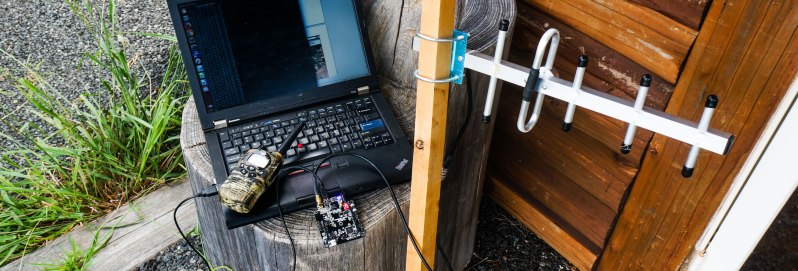Hackday regular [Akiba] is working on a series of video tutorials guiding newbies into the world of the 802.15.4 wireless protocol stack — also known as ZigBee. So far, his tutorials include a “getting started with chibiArduino”, his own Arduino-based wireless library, as well as a more basic tutorial on how radio works.
[Akiba] already made a name for himself though a large number of wireless projects, including his Saboten sensor boards, which are ruggedized for long-term environmental monitoring. The Saboten boards use the same wireless stack as his Arduino-compatible wireless development boards, his Freakduino products. The latest version features an ATmega 1284P with 8x the RAM and 4x the flash of the older, 328P-based Freakduinos. It comes in both 900 MHz and 2.4 GHz and there’s also a special 900 Mhz “Long Range” variant. The boards include some great power-saving features, including switchable status LEDs and on-board battery regulation circuity allowing one to run a full year on two AA cells while in sleep mode. They also have a USB stick configuration that is great for Raspberry Pi projects and for running straight from the PC.
For more [Akiba] goodness, check out our colleague [Sophi]’s SuperCon interview with him as well as our coverage of his Puerto Rico lantern project.
















nice tutorial
Great idea. Are there any cheaper clones available?
The Xbee 2.4Ghz module itself costs $24 still from Ali:
XBee module Series upgrade S2 S2C Zigbee module wireless data transmission module imported
http://s.aliexpress.com/Zzue2yE3
Xbee is a cool low power long range low bandwidth serial but yes, so damn expensive despite being something like 15 years old or more. Hey Atmel, unless it gets cheap your standard won’t get very standard even if you have leverage being the source for much of the microcontroller market. I have rarely seen xbee in anything except Atmel catalogs despite its very cool capabilities.
The original imported XBee modukes are really expensive. But you get CC2530 based modules for $4-5 and NRF51822 based modules for <$3. Although I do not know how good they are or if there are features unsupported by this cheap modules.
OK, the NRF based modules are Bluetooth modules, mislabeled in the title.
Zigbee would sound interesting if there were cheap modules including micro (or SOC) that could do a lot of things out of the box without a lot of programming. But you cannot get cheap stuff because of licensing reasons and because the protocol is so complicated that it requires strong micros.
For hobby level, i think it is hard to beat RFM69 + whatever micro you prefer.
You could buy Akiba’s devices from his shop. 27USD. For that you get the radio, an Arduino, battery charge controller and an 100% open source stack alternative to zigbee.
Or look into LoRa.
Please, IEEE 802.15.4 is *NOT* ZigBee. Even the tutorial NEVER mentioned Zigbee and it teaches IEEE 802.15.4 only. This article is wrong from the title.
:/ And I got all excited someone made clear tutorials for the tons of standards and details that seem to surround ZigBee.
Wouldn’t be surprised if one had to pay to read those *standards*.
You can download the standards for free from zigbee.org. However, if you want to sell a product as being ‘zigbee’, that’s when you’ll end up paying.
+1
I just came to say the same, IEEE 802.15.4 and ZigBee isn’t the same. IEEE is a standard protocotol and ZigBee is a set of specifications based in IEEE 802.15.4. Can be said that the ZigBee is a layer over the IEEE 802.15.4, but isn’t the same
Xbee is significantly overpriced, slow, and terrible range for the power. Check out some SI radios if you need high speed with good range, check out SX chips for max range.
Could you post a link?
Don’t know how to search for these SI/SX radios.